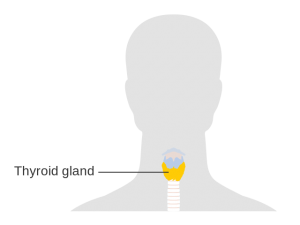Thyroid Disorders, sub-clinical hypothyroidism, and related endocrine system problems
The single biggest complaint we hear from clients is that they are exhausted, gaining weight for no good reason, or are just miserable all the time. They wonder if their thyroid is functioning properly, but their medical doctors tell them their blood tests are “normal.” If this is you, help is on the way.
One Small Gland, Many Big Problems
 It’s amazing, but true: disorders of this one small gland can be responsible for any and all of the conditions on the home page – and even more not listed. The thyroid controls the metabolic rate of every cell in the body, so thyroid health affects your entire being whether it’s obvious or not. High cholesterol or depression, for example, are conditions that may be trying to communicate that the thyroid gland is dysfunctional, or that your cells are not responding to thyroid hormones, or that your brain is not messaging to the thyroid to produce hormones.
It’s amazing, but true: disorders of this one small gland can be responsible for any and all of the conditions on the home page – and even more not listed. The thyroid controls the metabolic rate of every cell in the body, so thyroid health affects your entire being whether it’s obvious or not. High cholesterol or depression, for example, are conditions that may be trying to communicate that the thyroid gland is dysfunctional, or that your cells are not responding to thyroid hormones, or that your brain is not messaging to the thyroid to produce hormones.
The Importance of the Endocrine System
The thyroid is part of the body’s endocrine system, a collection of glands that secrete hormones, which travel via the circulatory system to their targets. These hormones regulate metabolism, growth and development rates, sexual function and reproduction, sleep, and mood, among other things. In a healthy person the glands of the endocrine system work in an intricate, dance-like partnership with each other. If there is a problem with one gland, the rest of the system slowly goes out of balance. When stress is high on the body for a prolonged period of time, for example, the adrenal glands can have problems producing cortisol, but without appropriate levels of cortisol, the body then has trouble using thyroid hormones. We regularly see this pattern of thyroid-adrenal dysfunction in our clients.
What Can Go Wrong?
Many factors control how much thyroid hormone your body will make and convert, such as the availability of minerals like iron, zinc, and copper. Perhaps your body is dealing with inflammation from foods that you can’t digest, or there are toxic levels of mercury or lead burdening your systems. Maybe halogens (chlorine, fluorine, bromine) are blocking your iodine receptors. Whiplash accidents usually injure the thyroid gland.  Head injuries can interfere with messaging of the endocrine system, including the thyroid. There are many inherited disorders of the thyroid, such as food allergies (which run in families), underdeveloped glands, poor absorption of certain nutrients like zinc or B12, and suboptimal immune response. Unrelenting stress at any point in life can cause thyroid and adrenal collapse.
Head injuries can interfere with messaging of the endocrine system, including the thyroid. There are many inherited disorders of the thyroid, such as food allergies (which run in families), underdeveloped glands, poor absorption of certain nutrients like zinc or B12, and suboptimal immune response. Unrelenting stress at any point in life can cause thyroid and adrenal collapse.
The important thing to remember about the thyroid and adrenals is that no illnesses will fully heal, and no infections can clear, unless there are enough of these hormones circulating in your body and able to get into your cells.
How to Test for Thyroid Issues
Unfortunately, current medical testing for evaluation of thyroid function is very limited. The TSH test, which measures the amount of “thyroid stimulating hormone” in the bloodstream, is considered the standard of care for optimal measure of thyroid hormone levels. But TSH is not produced by the thyroid. It is produced by the pituitary gland, and as such can’t tell us how much actual thyroid hormone is circulating in the body. It also can’t tell how much thyroid hormone is actually in your cells.
Muscle-testing analysis is an excellent tool for pinpointing the needs of your particular body. It can help you learn where your endocrine pathways are broken, and what can help resolve this. Often a change in diet can work wonders, as can certain supplements that support the healthy functioning of the thyroid.
Prescriptions are Sometimes Necessary
However, in Pati’s experience, once someone has lived for many years with their thyroid limping along, these pathways can be difficult to heal. For those clients, Pati may recommend natural glandular extracts of thyroid hormone, specifically, prescription medications such as Armour Thyroid or Nature-Throid. Pati has developed relationships with local medical providers who will prescribe these medicines for her clients should her muscle-testing analysis indicate this need, even if their lab results for thyroid function look normal (indicating “sub-clinical hypothyroidism”).
A great benefit of Pati’s work with young children is that these negative pathways can be averted, so the need for prescription hormone replacement later in life can be mitigated.
